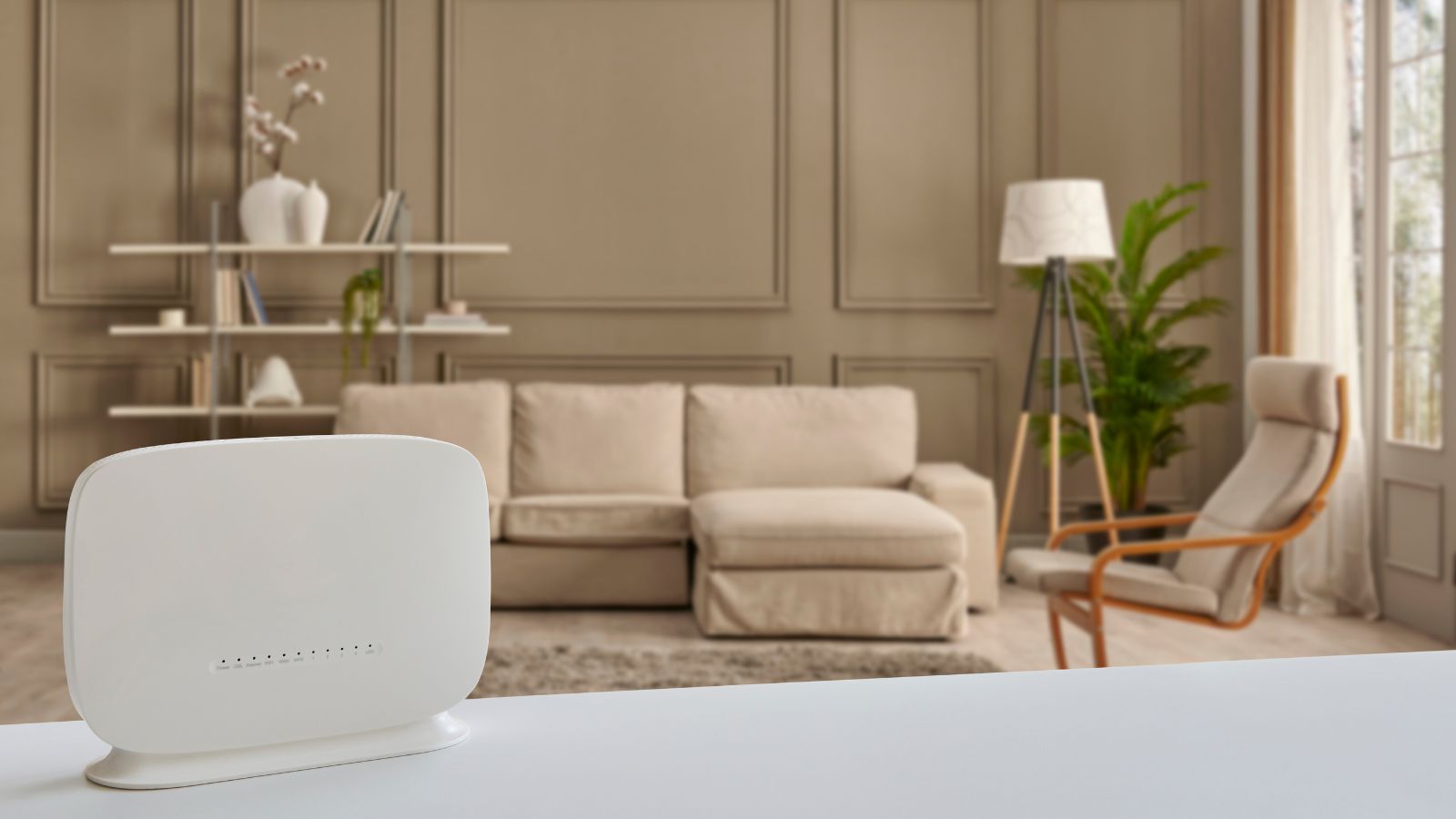These are the best places to put your WiFi router to improve your internet signal
A little strategic location scouting goes a long way in optimizing WiFi efficiency in any living space


Design expertise in your inbox – from inspiring decorating ideas and beautiful celebrity homes to practical gardening advice and shopping round-ups.
You are now subscribed
Your newsletter sign-up was successful
Want to add more newsletters?

Twice a week
Homes&Gardens
The ultimate interior design resource from the world's leading experts - discover inspiring decorating ideas, color scheming know-how, garden inspiration and shopping expertise.

Once a week
In The Loop from Next In Design
Members of the Next in Design Circle will receive In the Loop, our weekly email filled with trade news, names to know and spotlight moments. Together we’re building a brighter design future.

Twice a week
Cucina
Whether you’re passionate about hosting exquisite dinners, experimenting with culinary trends, or perfecting your kitchen's design with timeless elegance and innovative functionality, this newsletter is here to inspire
Having a reliable internet connection is vital in modern life, especially for those working from home or living in smart homes where everything is controlled by digital platforms. So why let your router be an afterthought? By putting some thought into its positioning, you'll be rewarded with faster, more reliable internet access in all corners of your home.
This simple fix requires no technical know-how but can have a major positive impact. The key is to remember that the physical positioning and surrounding environment matter just as much when it comes to finding the best spot and avoiding the worst places for your WiFi router.
With so many of our modern devices and services relying on strong, stable, far-reaching, and faster WiFi, a few simple adjustments to your router's location can make a world of difference.
The best places to put your wifi router
Every space is unique, so don't hesitate to experiment with different placement options. You can also monitor signal strength using tools like WiFi analyzer apps to find the optimal position for your home.
1. A central location
Just as we centralize key living spaces to improve flow and accessibility, positioning your WiFi router centrally within the home is crucial.
'Wi-Fi signals radiate outward from the router in all directions, so having it tucked away in a corner of your house means lots of dead zones and spotty coverage elsewhere,' explains Maria Opre, a senior analyst at EarthWeb. 'Ideally, you want to find a central spot that allows the signal to disperse evenly to all the areas you need internet access.'
Placing a router centrally prevents the signal from being too weak in areas where it's needed most, like living rooms or home offices, and ensures the greatest range of reach. This also prevents the signal from being directed outside, optimizing coverage indoors.
Design expertise in your inbox – from inspiring decorating ideas and beautiful celebrity homes to practical gardening advice and shopping round-ups.
While placing it on a centralized floor in a centralized room should do the trick, Vance Tran, the Co-Founder of Pointer Clicker, recommends one unconventional but highly effective place to locate your WiFi router: 'Tucked under the stairs between floors. This space acts as a natural signal booster between floors. Also, some materials used in constructing stairs, such as wood or drywall, can reflect and absorb WiFi signals, enhancing their propagation between floors.
'This placement has the added bonus of reducing interference from other electronic devices, leading to improved signal strength and stability. Just make sure it's secured from dust.'
2. An elevated position
Elevation is another critical factor. It's best to have your router elevated off the floor for maximum range.
Placing the router at a higher point in a room can enhance signal dispersion and prevent obstructions hindering this. For example, keeping it on a desk, high shelf, or ceiling beam or mounting it on a wall at standing height – such as this WALI wall mount from Amazon – can prevent coverage issues caused by the signal having to pass through floors and furniture.
'Speaking of obstructions, steer clear of surrounding your router with anything overly dense like fish tanks, mirrors, or huge pieces of furniture which can absorb and weaken the Wi-Fi signal,' advises Maria Opre.
3. On a designated stand
While not essential, placing your router on a designated stand will not only keep it elevated but also prevent all obstructions from undermining the effectiveness of the signal.
The stand should be positioned somewhere with a clear path at all angles, free from any furniture or metal fixtures that could block its signal. So, if you plan to keep it in your living room, consider getting a stand high enough to keep your router above your sofa and coffee table.
Meyer Wooden Drink Table | $129.00 from West Elm
While a WiFi router is not the most stylish addition to any living space, what it may lack in aesthetic value, you can more than make up for with a stylish stand, such as this one, ranging from 18"–21" tall.
Additional tips
If placing your WiFi router in a better location doesn't improve its effectiveness as much as you'd like, there are a few other methods that can be used.
'Consider upgrading your router: If you have dead zones or weak signals in certain areas of your home, investing in a new WiFi router or mesh networking kit can help improve coverage and signal strength,' says George Baronat from eMerchant Authority. These TP-Link Deco 6 WiFi mesh systems are a popular choice on Amazon.
Avoid wireless range extenders when possible: While range extenders can help in specific situations, they may slow down overall performance due to signal repetition. Mesh networking kits are a better option for larger homes or areas with connectivity issues.
Utilize wired connections: Ethernet backhaul, using wired connections between access points and the primary router, is highly effective for improving network speed and reliability, especially in larger homes or multi-level spaces.
Keep electronics away from your router: Avoid interference from large appliances and metal objects by placing the router away from the kitchen area or large metal decorations, which can impede signal strength.
Consider antenna positioning: 'If your router has external antennas, you can position them vertically (one vertically, one horizontally) to cover more ground,' advises Laviet Joaquin, the Marketing Head at TP-Link.
By taking all these elements into account and finding that prime router real estate, you can boost speeds, reduce dead zones, and ensure your Wi-Fi keeps everything from smart home must-have devices to work calls functioning smoothly.

Lola Houlton is a news writer for Homes & Gardens. She has been writing content for Future PLC for the past six years, in particular Homes & Gardens, Real Homes and GardeningEtc. She writes on a broad range of subjects, including practical household advice, recipe articles, and product reviews, working closely with experts in their fields to cover everything from heating to home organization through to house plants. Lola is a graduate, who completed her degree in Psychology at the University of Sussex. She has also spent some time working at the BBC.
